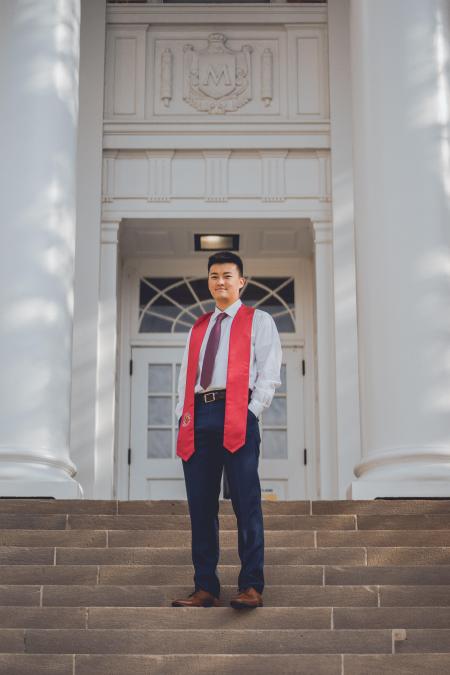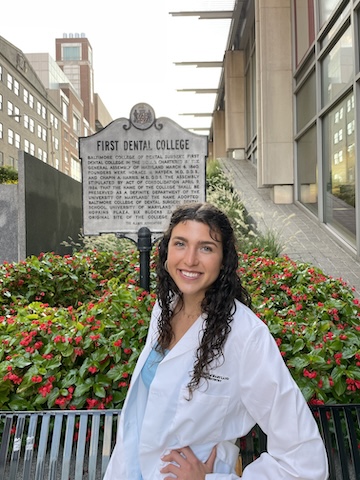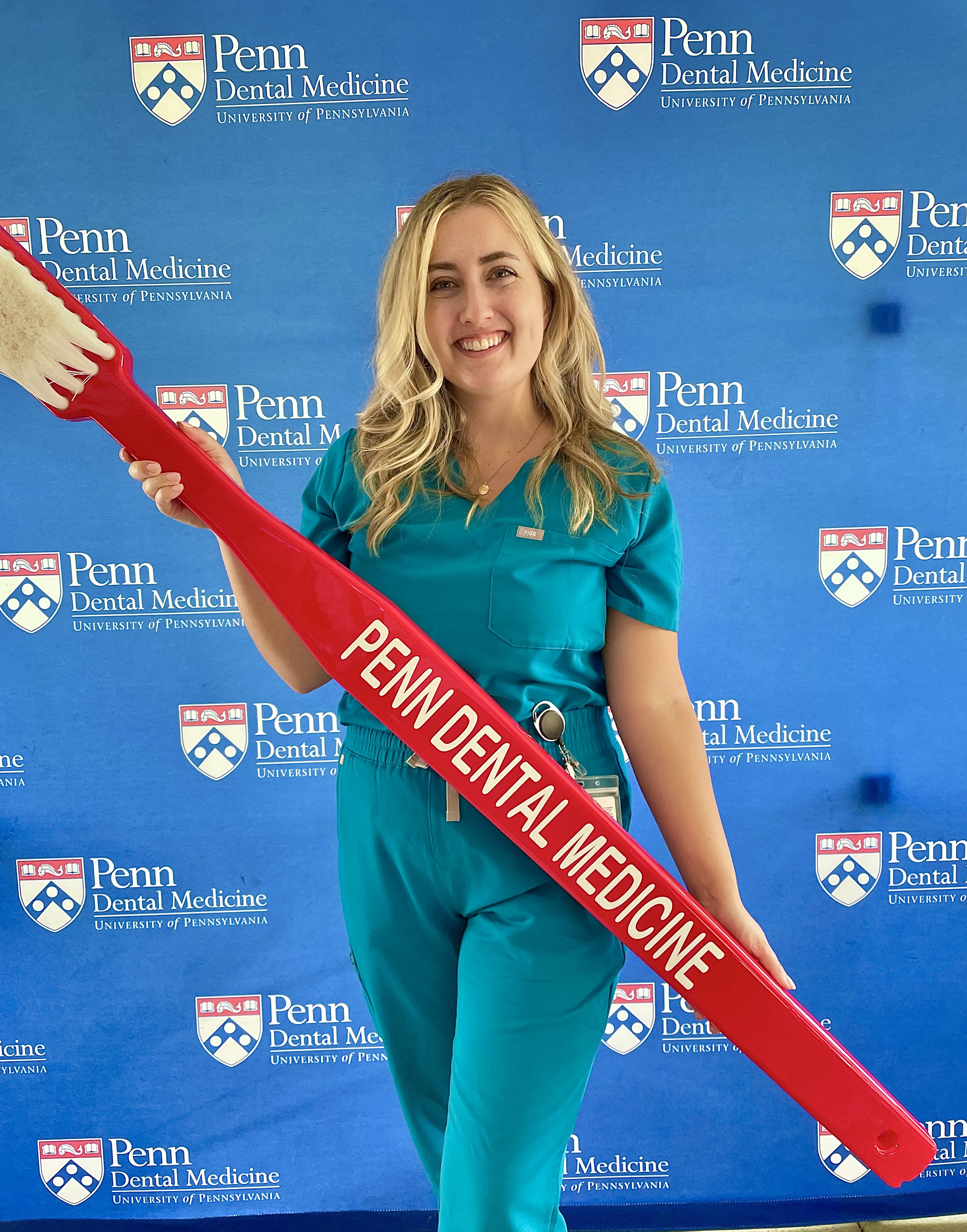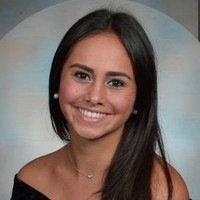Dentistry is the practice of the diagnosis, treatment, and prevention of oral health disease. After four years of dental school, students are awarded either a DDS (Doctor of Dental Surgery) or DMD (Doctor of Dental Medicine). A career in dentistry is dynamic, offering you the opportunity to practice in different clinical environments. Many dentists go on to work in the private sector and even expand their entrepreneurial efforts by starting their own practices. For more information on dentists' opportunities and job statistics, please see the Bureau of Labor Statistics: Occupational Outlook Handbook.
Becoming a dentist is a rigorous, competitive, and rewarding process that requires:
- Earning an undergraduate degree and completing prerequisite coursework
- Taking the Dental Admission Test
- Completing Dental School (4 years)
- Potentially completing a residency program; applicants can practice general dentistry after completing dental school, but many opt to specialize, which may require an additional 1-6 years of training.
PLEASE NOTE: The requirements/recommendations below apply to a majority of dental schools; however, please reference the ADEA AADSAS Participating Dental Schools Required and Recommended Courses Worksheet![]() for school-specific requirements. Dental schools also have varying policies regarding AP credit, so check school websites to confirm AP policies.
for school-specific requirements. Dental schools also have varying policies regarding AP credit, so check school websites to confirm AP policies.
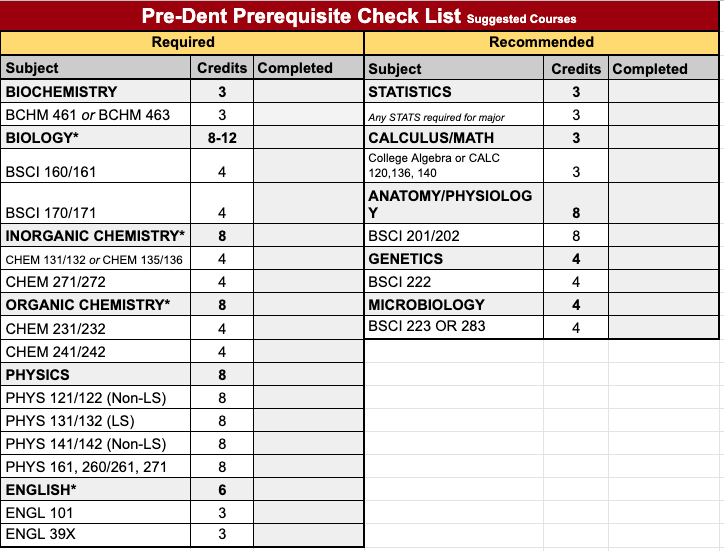
There are many Minors that cover topics critical to expanding understanding of the various determinants of health. Coursework related to Diversity, Equity, and Inclusion can be helpful in developing cultural awareness, cultural humility, and an understanding of systemic discrimination in the health care system. Even if your academic plan does not permit adding a minor, it is worth reviewing the curated course lists for courses that will stretch you, increase your language for difference and disparity, show your intellectual curiosity, and improve your critical reasoning skills.
Requirements:
- At least 1-2 years long-term of clinical experiences. Dental schools expect applicants will have gained exposure to dentistry through experiences that provide insight into the dentist-patient relationship and into the realities of a career in dentistry. A great place to start is Shadowing. Shadowing allows you to observe procedures, become familiar with dental terminology and techniques, and speak to professionals about their experiences in dentistry.
- At least 1 year of long-term community service work. Dental schools look for substantive, longitudinal service experiences that show a commitment to your community and a curiosity about the lived experiences of others.
- Continuous manual dexterity development and mastery.
Application Resources
- American Dental Education Association (ADEA)
- Associated American Dental Schools Application Service (AADSAS)
- Dental Admission Test
- Preparing for the DAT
- DAT Prep Resources
- Explore Dental Schools
Additional Resources
American Association of Public Health Dentistry
Summer Health Professions Education Program and Dental Education Program
Student Organizations
American Student Dental Association
Charles R. Drew Pre-Medical/Health Society
*** In addition to the above opportunities, there are more than 350 private dental practices within a 20-mile radius of College Park. Search online to identify those which might suit you best in terms of location and dentistry focus (general, surgical, cosmetic, etc.). Call them to ascertain the availability of volunteer clinical opportunities.
For highly motivated and academically talented students, the University of Maryland, College Park and University of Maryland School of Dentistry offer the three-year Arts-Dentistry Program. This program gives students the opportunity to apply to the University of Maryland School of Dentistry one year early. This accelerated program requires students to complete their dental school admission requirements in three years, as they apply to dental school at the end of the second year and the beginning of their third year. Competitive students must apply and be accepted by the University of Maryland Dental School. Students accepted into the combined arts-dentistry program receive the B.S. degree (Arts-Dentistry) after satisfactory completion of the first year at the dental school and upon the recommendation of the Dean of the School of Dentistry and approval of the University of Maryland, College Park. Participation in the combined-degree program at the University of Maryland, College Park does not guarantee admission to the University of Maryland School of Dentistry.
To be eligible for this program, students must begin at the University of Maryland as first-semester freshmen and should declare their interest early in their freshman year by attending an Intro Workshop and meeting with an HPAO advisor.
Average acceptance information for students admitted to the University of Maryland Schools of Dentistry in 2022:
DAT (5th-95 Percentile / Mean)
- Academic Average:19-25 / 21.7
- Perceptual Ability: 17-24 / 20.6
- Total Science: 18-25 / 21.4
GPA (5th-95th Percentile / Mean)
- Science: 3.20-3.99 / 3.63
- Total: 3.35-3.99 / 3.71
Source: Dental School Explorer
Recommended Timeline
Freshman Year
- Students must identify their interest in this program.
- Begin general education requirements along with dental school course requirements. It is better to focus on the science and math pre-dental requirements in the freshman and sophomore year rather than the university general education requirements in the humanities and social sciences. Be mindful that the math/science courses will count for the math/science general education and prepare the student for the DAT. Students need to be efficient in completing these pre-dental courses because they will prepare you for the DAT which is taken a year earlier than if you were typically applying to dental school as a traditional student. Students will have their junior year to focus on completing some of the general education courses. This is why it is extremely important for the student to develop a semester plan with the pre-dental and academic advisor.
- Attend an Intro Workshop.
- Begin building relationships with your professors. Go to their office hours and participate in class lectures and discussions. You will need to identify professors to write letters of recommendation on your behalf.
- Students are strongly encouraged to join the Pre-Dental Society and become an active member.
- Begin clinical shadowing and community service by the summer following FR year if not before, and plan to continue the experience into the fall and forward.
Sophomore
- Students must continue general education/Math/Science requirements
- Students are strongly encouraged to join the Pre-Dental Society and become an active member.
- Students should begin to think about a possible major in case they are not accepted to UMD Dental School for their senior year. Students need to be prepared to complete their bachelor's degree at UMD if they are not accepted.
- Students must begin to prepare to take the DAT. Preparation courses are often utilized by pre-dental students. Do realize though, that there are other options for DAT preparation. Students should plan on taking the DAT by June of their sophomore year.
- Students must begin the application process to UMD Dental school late spring/early summer (June) of the sophomore year through AADSAS. This process will require the student to utilize the credentials application services of the HPAO. During your first semester sophomore year, begin attending the application workshops provided by the HPAO. Watch for pre-health packet materials to be posted on the website in November.
Junior
- Students must continue completing pre/dental courses, if any and general education requirements. Students must finish all university general education requirements by the end of their junior year and before they matriculate to UMD Dental School.
- Students will continue to complete the dental school application process that they started at the end of their sophomore year. Attending the application workshops in HPAO will help keep you on track.
- Those students who are deemed competitive by UMD Dental School will receive an invitation for an interview.
- If student is notified that they are not accepted by UMB, then they need to proceed with their major requirements for graduation.
- Students who are not accepted may still be competitive for admission as traditional applicants.
Senior
- If accepted, students will matriculate to UMB, having completed a minimum of 90 credits at UMD and having completed all general education requirements. The student's senior year will be completed in residence at UMB.
- In order for the student to receive a Bachelor's degree from UMD in Arts/Dentistry, the student is responsible to inform the Undergradute Studies Coordinator, as well as the HPAO after they complete their first full year at UMD, Baltimore. HPAO and the Office of Undergraduate Studies are not responsible for tracking a student's progress through the first year of dental school or for filing the paperwork for the student to be confered the B.S. from UMD.



